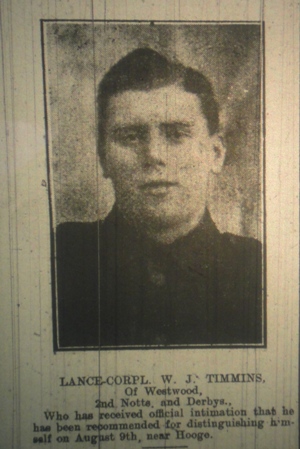Lieutenant John William Timmins
Royal Welsh Fusiliers
Hertfordshire Regiment(Second Lieutenant)
Sherwood Foresters (Notts & Derby Regiment) (13853 Private)
 John William Timmins was born at Westwood, Notts in 1895, son of Walter Timmins, born Stourbridge, Worcs, a labourer and his wife Esther Hannah Willets born Dudley, Staffordshire. In 1911 the family was living at Old Westwood (Palmerston Street) and John was aged 16, employed as a collier. John’s eldest sister Lilly had been born at Dudley in 1881. His brothers Eli and Walter were born in Derby in 1887 and 1889 respectively but by 1892 the family had moved to Westwood where he and his sister Amelia was born.
John William Timmins was born at Westwood, Notts in 1895, son of Walter Timmins, born Stourbridge, Worcs, a labourer and his wife Esther Hannah Willets born Dudley, Staffordshire. In 1911 the family was living at Old Westwood (Palmerston Street) and John was aged 16, employed as a collier. John’s eldest sister Lilly had been born at Dudley in 1881. His brothers Eli and Walter were born in Derby in 1887 and 1889 respectively but by 1892 the family had moved to Westwood where he and his sister Amelia was born.
John joined the Sherwood Foresters in 1914 and by 1st January 1915 he was serving in France. John is mentioned in an article in the ‘Ripley & Heanor News’ on 17th September 1915 which commends Lance Corporal WJ Timmins of Westwood, 2nd Notts & Derby, ‘Who has received official intimation that he has been recommended for distinguishing himself on August 9th, near Hooge.’.
A later article, written by John himself, explains the events at Hooge on that day.
‘Jacksdale Soldiers’ Experiences. Good Work by the Sherwoods.
In the following letter, Private J. W. Timmins, 13853, B Company, 2nd Sherwood Foresters, 18th Brigade, 6th Division, whose home is at Jacksdale, gives his experiences in the trenches:-
“I feel as if I should like to express my thoughts to you, so as you may tell the people in my district in your paper. On the night of the 8th August, we (the 2nd Sherwood Foresters) made our way to the firing trench, about 60 yards from the Germans. There we stayed until 25 minutes past two. Then one of the greatest bombardments with our big guns that I have ever heard started: My Company went up a disused trench which was half held by the Germans. Bomb throwers were called to the fore, and we bombed the Germans out of the trench. The German big guns were showering shells upon our now newly taken trenches, and a lot of my comrades fell by my side, but the remainder of us just kept going on killing dozens of Germans. We had taken our own trench back and also two of theirs, when a big gun from Hill 60 played havoc on the trench, killing lots of our brave boys. Still we stood firmly in the trench, and a message was sent to Battalion headquarters. As we were firmly set in the trench we needed the machine guns to come up, and up they came as fast as possible. The men got them into position and they simply killed all before them.
“All of a sudden we lost our Captain, as he was hit with an explosive bullet, killing him instantly. I was so sorry, because he had led us into action so bravely. The fighting now was very fierce, but, of course, the good old Sherwoods stuck at it manly. The Germans dropped so many Jack Johnsons in our trench that the ground was nearly all level. A shell had buried our officer commanding the Company, and ten minutes afterwards we had another officer buried. And yet it was fine how our men stuck it so bravely, not being the least afraid.
“We had now played havoc with the Germans, killing so many. I saw several wounded lying in their old trench. How afraid they were, and yet our boys never touched them, in fact they were crying out for water, and we gave them some. Then our one and only officer fell, and that left us without a commanding officer, but we still bravely kept on fighting. It was getting late in the day, so of course we knew we should be relieved soon. The shells were still coming as fast as ever, the ridge being nearly levelled, leaving no trench whatever. It was all shell holes, and many times we thought that it was our last, when quite unnoticed the darkness fell and we were relieved. It was an experience I shall never forget. In my platoon there were ten of us left, and I think I am one of the most fortunate boys alive. So many thanks to God for protecting me so well. In winning such a position thanks were due for doing our bit. Altogether we lost 12 officers and many men.”
On 29th August 1917 John was commissioned from the ranks. His service records do not seem to have survived but his Medal Rolls Index Card confirms he was awarded the 1914-15 Star, the British War and Victory Medals.
After the war, in 1919 John married Amelia Stoppelhardt at Ecclesall Bierlow. Amelia was born in Liverpool, Lancs and her father was Austrian. They moved to Jacksdale where they ran the Portland Arms Public House. They had a son named Roy Edward John Timmins who was to serve as a Lieutenant with the Royal Engineers during WW2 and lost his life in 1943, aged only 23 during Operation Market Garden, at Arnhem. They also had a daughter named Yvonne who married a local WW2 Lieutenant Barry Hardwick.
John’s wife Amelia Timmins died in 1986, but we have not been able to trace what became of John.









